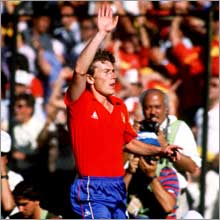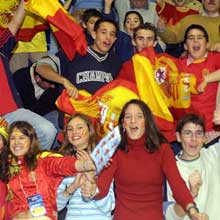
Spain History

Victory long
overdue
For a country with one of Europe's strongest leagues, Spain have a disappointing
record on the international stage.
Olympic debut
The Spanish Football Association was formed in 1913 and seven years later Spain
entered the football tournament at the Olympic Games in Antwerp where they won
the silver medal. It was not the only notable achievement of that inaugural
decade: in 1929, the year after the introduction of a professional national
league, Spain became the first country from outside the British Isles to beat
England, winning 4-3 in Madrid.
Boom time
The Spanish made their debut appearance in the 1934 FIFA World Cup, beating
Brazil in the first round before losing to Italy, but boom time for Spanish
football came in the 1950s. To herald the decade that would see Real Madrid CF
take a stranglehold on European club competition, Spain produced their best ever
World Cup performance at the 1950 finals in Brazil. They won all three of their
first-round group games before finishing fourth in the four-team group which
decided the destiny of the trophy.
Club dominance
Although Madrid stars Alfredo di Stéfano, an Argentinian, and Ferenc Puskás, a
Hungarian, took Spanish nationality to play for the home country, they could not
inspire success on the field. The mercurial Puskás played in the Spanish team at
the 1962 World Cup squad where, coached by an Italian, Helenio Herrera, the
Spanish fell at the first hurdle.
Finest hour
The following year saw the advent of a ten-year ban on foreign players in the
Spanish league but 12 months later, in 1964, Spain's footballers enjoyed their
finest hour. Hosting the UEFA European Championship, they beat Hungary 2-1 in
the semi-finals before defeating the Soviet Union 2-1 in front of 120,000 fans
in Madrid. Marcelino Martínez was the hero with the winning goal six minutes
from time.
Anticlimactic finals
Spain had high hopes of repeating that triumph when they hosted the 1982 World
Cup but the weight of expectancy proved too much. After scraping through the
first round - their results included a draw with Honduras and a defeat by
Northern Ireland - they fell at the second stage.
Near miss
A more impressive performance came at the 1984 European Championship finals in
France. A last-minute header from Antonio Maceda gave them a 1-0 victory over
holders West Germany which secured Spain's progress to the semi-finals where
they defeated Denmark on penalties after a 1-1 draw. Disappointment followed in
the final, however, as they succumbed 2-0 to hosts France.
'The Vulture'
The 1986 World Cup in Mexico saw the arrival on the international scene of
Spain's lethal marksman Emilio Butragueño. Spain fell at the quarter-final
stage, but even though 'El Buitre' - 'The Vulture' - scored four goals against
Denmark in the second round, he could not stop Spain losing on penalties to
Belgium after a 1-1 draw.
New generation
A gold medal at the 1992 Olympics in Barcelona marked the emergence of a new
generation of stars, including Luis Enrique and Josep Guardiola. These players
impressed in the 1994 World Cup in the United States where Spain were unlucky to
lose to Italy at the quarter-final stage. More quarter-final woe followed at
EURO 96™ where Spain lost a nail-biting encounter against England on penalties.
Quarter-final curse
After a dismal display at the 1998 World Cup, notable mainly as the final
tournament of goalkeeper Andoni Zubizarreta - his country's record caps holder
with 126 appearances - the quarter-final curse was to return as Spain bowed out
at that stage of UEFA EURO 2000™ and the 2002 World Cup.
Country Info

Spain on the up
AREA: 504,782 sq km
POPULATION: 40,217,413
NEIGHBOURS: Andorra, France, Portugal
LANGUAGES: Castilian Spanish, Catalan, Galician, Basque
CAPITAL CITY: Madrid
A nation of four languages forged after centuries of invasions, Spain emerged from a long period of military dictatorship in the 1970s to return to the heart of Europe and confirm their status as one of the continent's great footballing nations.
Roman ruins
Gradually subdued by the Romans during the course of the third century BC,
Hispania proved a tough nut to crack for the Europe's first great superpower.
However, when Roman Spain fell it was not to a revolt but a massive invasion by
Germanic Visigoths in 409AD. The Visigoths would go on to rule until 711 when
their last king, the very un-Spanish sounding Roderick, was routed by invading
forces from across the Strait of Gibraltar.
Moorish invasion
The Moorish Muslim forces were to colonise the whole of southern Spain and make
significant in-roads into the north, leaving their mark in arts and sciences,
agriculture as well as some magnificent buildings. It took the best part of 800
years for Spain to evict their last major wave of invaders.
The 'Reconquista'
This happened partly thanks to the uniting of the kingdoms of Castilla and
Aragón in the 15th century with the marriage of Isabel, princess of Castilla, to
Fernando, heir to the throne of Aragón. The Roman Catholic monarchs finally
completed the 'Reconquista' in 1492 - the same year that a Spanish-sponsored
mission by the explorer Cristoforo Columbus landed in the Americas and began a
period of unrivalled wealth and success for Spain fuelled by gold from their
colonies.
Declining empire
However, what followed with the collapse of the Spanish Empire was to be
anything but happy. Napoleon's invasion of Spain in 1808 saw the nation's
colonies dwindle, and although the French were sent packing in 1813 and the
Spanish monarch was re-established a year later, the disastrous 20-year reign of
Fernando VII saw persecution, repression and economic decline. Defeat in the
1898 Spanish-American War heralded the end of the Spanish Empire and preceded
another miserable period for Spain.
Modern dictatorship
Republican and monarchist forces battled inconclusively in the early part of the
20th century, prompting a military coup in 1936. The resulting Spanish Civil War
saw the Republican factions beaten by right-wingers, with General Franco
emerging triumphant in 1939 to begin a 36-year dictatorship which would see
Spain shunned by many in Europe.
Footballing success
By this time Spain was already a major footballing power, having been the first
team from continental Europe to beat England with a 4-3 win in 1929. The 1950s
saw Spain begin to make an impact in international competition with a
fourth-placed finish at the 1950 FIFA World Cup finals.
European triumph
A keen football supporter, Franco's assistance may have done much to raise the
international profile of Real Madrid CF as they thrived in the 1950s, much to
the discontent of FC Barcelona supporters, while the 1960s saw Spain's biggest
success to date as they triumphed in the finals of the 1964 UEFA European
Championship.
Democracy restored
Franco's death in 1975 saw democracy restored in Spain and the nation was able
to demonstrate its new-found, tourism-derived wealth with the staging of the
1982 FIFA World Cup. However, much like England, Spain have struggled to bring
their brilliance to bear on the pitch since the 1960s, and it is in club
football where their real strength still lies.
Today Year 2004 Spain Team

Player name list
| Qualifying round | |||
| 07.09.2002 | v | Greece | 2-0 |
| 12.10.2002 | v | Northern Ireland | 3-0 |
| 29.03.2003 | v | Ukraine | 2-2 |
| 02.04.2003 | v | Armenia | 3-0 |
| 07.06.2003 | v | Greece | 0-1 |
| 11.06.2003 | v | Northern Ireland | 0-0 |
| 10.09.2003 | v | Ukraine | 2-1 |
| 11.10.2003 | v | Armenia | 4-0 |
| Playoff for Final Tournament | |||
| 15.11.2003 | v | Norway | 2-1 |
| 19.11.2003 | v | Norway | 3-0 |
| Group A | |||||||
| PLD | W | D | L | GS | GA | PTS | |
|
|
3 | 2 | 0 | 1 | 4 | 2 | 6 |
|
|
3 | 1 | 1 | 1 | 4 | 4 | 4 |
|
|
3 | 1 | 1 | 1 | 2 | 2 | 4 |
|
|
3 | 1 | 0 | 2 | 2 | 4 | 3 |